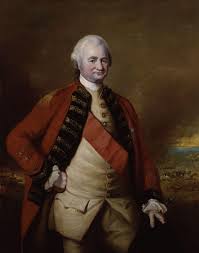Robert Clive: Difference between revisions
Created page with "{{#seo: |title=Sardar Vallabhbhai Patel – Iron Man of India and Architect of National Integration |description=Sardar Vallabhbhai Patel was a key leader of the Indian freedom struggle and the first Deputy Prime Minister of India. Known for unifying over 560 princely states, he is remembered as the Iron Man of India. |keywords=Sardar Vallabhbhai Patel, Iron Man of India, Deputy Prime Minister, Indian Independence, Patel Biography, Bardoli Satyagraha, Integration of Indi..." |
No edit summary |
||
| Line 1: | Line 1: | ||
{{#seo: | {{#seo: | ||
|title= | |title=Robert Clive – Founder of British Rule in India | ||
|description= | |description=Robert Clive, also known as Clive of India, was a British officer and statesman who played a major role in establishing the British East India Company's control over Bengal. Learn about his life, battles, and legacy. | ||
|keywords= | |keywords=Robert Clive, Clive of India, Battle of Plassey, British East India Company, Bengal, colonial India, Company rule, British Empire | ||
|image= | |image=Robert_Clive.jpg | ||
}} | }} | ||
{{Infobox deceased | {{Infobox deceased | ||
| name = | | name = Robert Clive | ||
| image = | | image = Robert_Clive.jpg | ||
| image_caption = | | image_caption = Robert Clive, 1st Baron Clive | ||
| birth_date = {{Birth date| | | birth_date = {{Birth date|1725|9|29}} | ||
| birth_place = [[ | | birth_place = [[Shropshire]], [[England]], [[Great Britain]] | ||
| death_date = {{Death date and age| | | death_date = {{Death date and age|1774|11|22|1725|9|29}} | ||
| death_place = [[ | | death_place = [[London]], [[England]] | ||
| resting_place = [[ | | resting_place = [[Moreton Say]], [[Shropshire]] | ||
| nationality = | | nationality = British | ||
| occupation = | | occupation = Soldier, Colonial Administrator | ||
| years_active = | | years_active = 1744–1767 | ||
| known_for = | | known_for = Founding British control in India, Victory at [[Battle of Plassey]] | ||
| notable_works = | | notable_works = Key architect of [[British East India Company]] rule in India | ||
| awards = | | awards = Made Baron Clive of Plassey, British peerage | ||
| spouse = | | spouse = Margaret Maskelyne | ||
| children = | | children = 9 | ||
| religion = [[ | | religion = [[Anglicanism]] | ||
}} | }} | ||
''' | '''Robert Clive''' (29 September 1725 – 22 November 1774), known as '''Clive of India''', was a British military officer and colonial administrator who played a decisive role in establishing British control over parts of India. He is best known for his victory at the [[Battle of Plassey]] in 1757, which laid the foundation of [[British East India Company]] rule in Bengal and, eventually, much of India.<ref>https://www.britannica.com/biography/Robert-Clive</ref> | ||
== Early Life | == Early Life == | ||
Clive was born in [[Shropshire]], England, into a relatively modest family. He had a difficult youth and was sent to work for the [[British East India Company]] in [[Madras]] (now [[Chennai]]) as a clerk in 1744. Dissatisfied with office work, he later joined the Company’s military arm.<ref>https://www.nationalarchives.gov.uk/pathways/blackhistory/india/clive.htm</ref> | |||
== | == Military Career and Battle of Plassey == | ||
Clive gained prominence during the [[Carnatic Wars]], especially for his role in the successful defense of [[Arcot]] in 1751. However, his most significant achievement was at the [[Battle of Plassey]] on 23 June 1757, where he led Company troops against the [[Nawab of Bengal]], [[Siraj-ud-Daulah]].<ref>https://www.britishlibrary.cn/en/articles/the-battle-of-plassey</ref> | |||
Clive secured victory with the help of defectors like [[Mir Jafar]], who was promised the Nawabship in return. This victory allowed the British East India Company to gain control of Bengal’s revenues and administration. | |||
== | == Rise to Power == | ||
After Plassey, Clive became Governor of [[Bengal Presidency]]. He restructured Company rule and secured enormous personal wealth. In 1765, he returned to India and negotiated the [[Diwani rights]]—the right to collect revenue in Bengal, Bihar, and Orissa—for the Company from the [[Mughal Emperor Shah Alam II]].<ref>https://www.historytoday.com/archive/robert-clive-and-founding-british-india</ref> | |||
He | == Controversies and Death == | ||
Clive faced criticism back in Britain for alleged corruption and abuse of power. Although acquitted by Parliament, he suffered from depression and ill health. He died by suicide on 22 November 1774 in London. | |||
== | == Legacy == | ||
Robert Clive is a controversial figure. On one hand, he is credited as the founder of the British Empire in India and a brilliant strategist; on the other hand, his legacy is marred by accusations of exploitation and corruption. The vast wealth extracted from Bengal following his campaigns contributed to Britain’s imperial dominance but also caused severe economic strain and famine in India. | |||
His legacy | His actions and legacy remain widely debated in the context of colonialism, especially in modern India and Britain. | ||
== See Also == | == See Also == | ||
* [[ | * [[Battle of Plassey]] | ||
* [[ | * [[British East India Company]] | ||
* [[ | * [[Mir Jafar]] | ||
* [[ | * [[Bengal Presidency]] | ||
== References == | == References == | ||
<references/> | <references/> | ||
Latest revision as of 16:28, 13 July 2025
| Robert Clive | |
|---|---|

| |
| Robert Clive, 1st Baron Clive | |
| Born | 29 September 1725 |
| Birthplace | Shropshire, England, Great Britain |
| Died | 22 November 1774 (aged 49) |
| Place of death | London, England |
| Resting place | Moreton Say, Shropshire |
| Nationality | British |
| Occupation | Soldier, Colonial Administrator |
| Years active | 1744–1767 |
| Known for | Founding British control in India, Victory at Battle of Plassey |
| Notable works | Key architect of British East India Company rule in India |
| Awards | Made Baron Clive of Plassey, British peerage |
| Spouse(s) | Margaret Maskelyne |
| Children | 9 |
| Parents | |
| Religion | Anglicanism |
| Website | |
Robert Clive (29 September 1725 – 22 November 1774), known as Clive of India, was a British military officer and colonial administrator who played a decisive role in establishing British control over parts of India. He is best known for his victory at the Battle of Plassey in 1757, which laid the foundation of British East India Company rule in Bengal and, eventually, much of India.[1]
Early Life
Clive was born in Shropshire, England, into a relatively modest family. He had a difficult youth and was sent to work for the British East India Company in Madras (now Chennai) as a clerk in 1744. Dissatisfied with office work, he later joined the Company’s military arm.[2]
Military Career and Battle of Plassey
Clive gained prominence during the Carnatic Wars, especially for his role in the successful defense of Arcot in 1751. However, his most significant achievement was at the Battle of Plassey on 23 June 1757, where he led Company troops against the Nawab of Bengal, Siraj-ud-Daulah.[3]
Clive secured victory with the help of defectors like Mir Jafar, who was promised the Nawabship in return. This victory allowed the British East India Company to gain control of Bengal’s revenues and administration.
Rise to Power
After Plassey, Clive became Governor of Bengal Presidency. He restructured Company rule and secured enormous personal wealth. In 1765, he returned to India and negotiated the Diwani rights—the right to collect revenue in Bengal, Bihar, and Orissa—for the Company from the Mughal Emperor Shah Alam II.[4]
Controversies and Death
Clive faced criticism back in Britain for alleged corruption and abuse of power. Although acquitted by Parliament, he suffered from depression and ill health. He died by suicide on 22 November 1774 in London.
Legacy
Robert Clive is a controversial figure. On one hand, he is credited as the founder of the British Empire in India and a brilliant strategist; on the other hand, his legacy is marred by accusations of exploitation and corruption. The vast wealth extracted from Bengal following his campaigns contributed to Britain’s imperial dominance but also caused severe economic strain and famine in India.
His actions and legacy remain widely debated in the context of colonialism, especially in modern India and Britain.

